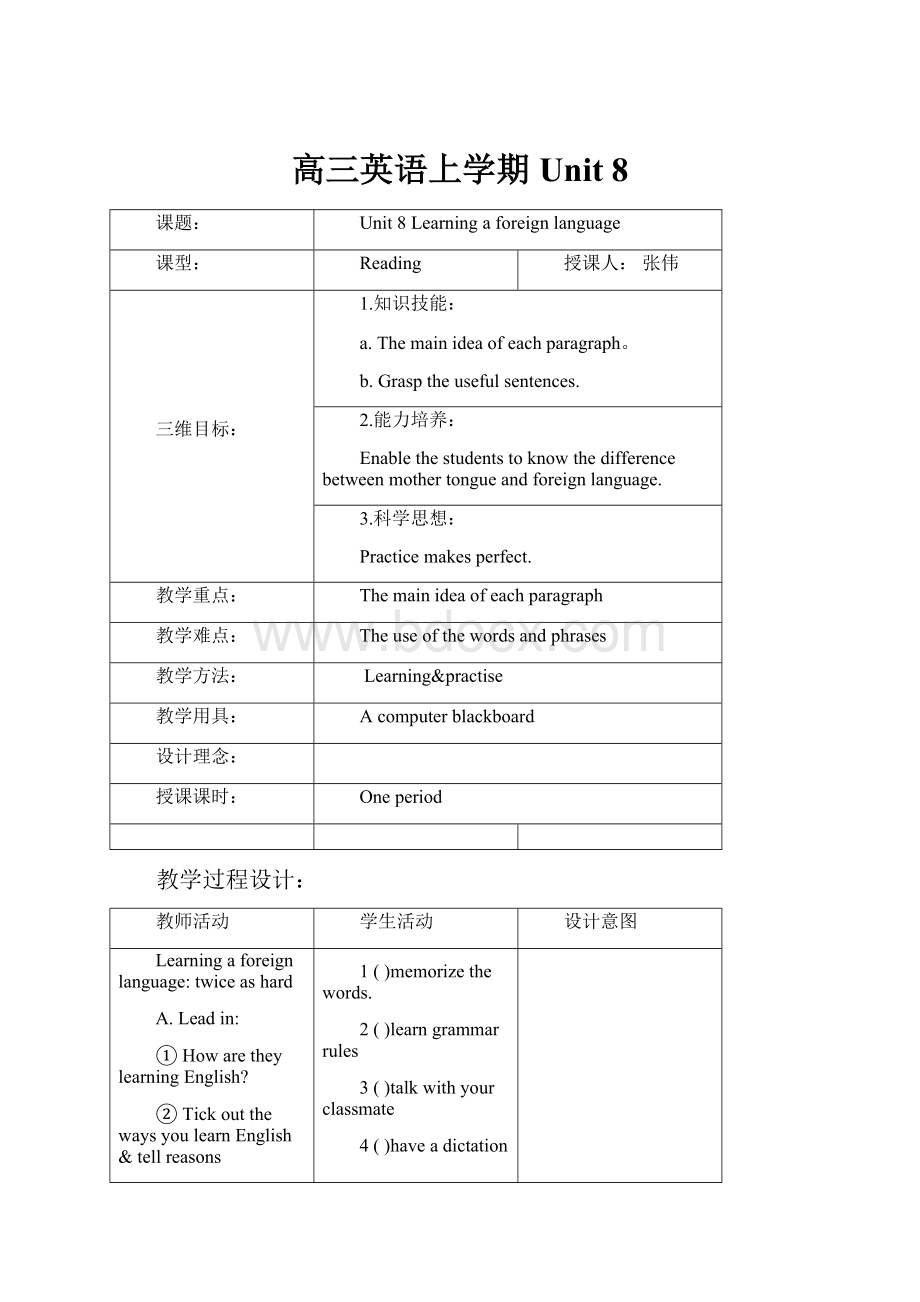高三英语上学期Unit 8.docx
《高三英语上学期Unit 8.docx》由会员分享,可在线阅读,更多相关《高三英语上学期Unit 8.docx(18页珍藏版)》请在冰豆网上搜索。

高三英语上学期Unit8
课题:
Unit8Learningaforeignlanguage
课型:
Reading
授课人:
张伟
三维目标:
1.知识技能:
a.Themainideaofeachparagraph。
b.Grasptheusefulsentences.
2.能力培养:
Enablethestudentstoknowthedifferencebetweenmothertongueandforeignlanguage.
3.科学思想:
Practicemakesperfect.
教学重点:
Themainideaofeachparagraph
教学难点:
Theuseofthewordsandphrases
教学方法:
Learning&practise
教学用具:
Acomputerblackboard
设计理念:
授课课时:
Oneperiod
教学过程设计:
教师活动
学生活动
设计意图
Learningaforeignlanguage:
twiceashard
A.Leadin:
①HowaretheylearningEnglish?
②TickoutthewaysyoulearnEnglish&tellreasons
③WhatdifficultiesinlearningEnglishyouface?
B.Fastreading:
1Howdowelearnournativelanguage?
2Howcanwemakesenseofwhatwelearnanddistinguishthemistakes?
3Whatarethedifferencebetweenmothertongueandforeignlanguage?
4Whatarethecharacteristicsofasuccessfullearner?
Howdoeshelearn
foreignlanguage?
5Whatisimportant?
Why?
Carefulreading:
I.SayForMonp68.
II.Tellthesentencestrueorfalse
1.Everydayactivitiesandinteractionswithotherpeopleareimportantwhenchildrenarelearningtheirmothertongue.
2.Ifwewanttobecomesuccessfullanguagelearner,weshouldtrytolearnallbyourselves.
3.IfwecouldspendallourwakinghourscommunicatingwithnativespeakerswewouldmakegreaterprogressinEnglish.
4.Welearnourmothertonguemuchfasterthanwedoaforeignlanguage.
5.Ifwewanttobecomesuccessfullanguagelearners,wemustfirstbuildourconfidenceanddevelopourstudyskills.
6.Althoughexpertsdon’tagreeeachother,theyallshareacommonopinion:
Lifeisaverysuccessfullanguageschool.
7.Westudyourmothertonguealldaylongforabout5yearsbeforewemasterit.Butweonlyspendafewhoursaweekandinafewyears’timewecanspeakaforeignlanguage.
8.Successfullanguagelearnersusuallystepawayfromtheacademicchallenges.
9.Thelessanxiousandmorerelaxedthelearner,theworsetheirlanguageacquisition.
II.Readingcomprehension:
1.Mostchildrenhavemasteredtheirmothertongue.
A.attheageoffive
B.bytheageofeight
C.beforetheyarefive
D.sincetheywerefive
2.Thesentence“Lifeisaverysuccessfullanguageschool”means.
A.weareequippedwithaspecialabilitytolearnlanguage
B.thekeytolearnthelanguagewellistocommunicatewiththepeoplearoundus
C.parentscangivechildrenlanguagelessons
D.peoplecanlearnthelanguagebythemselves
3.Infact,welearnEnglishmuchfasterthanwemayhavethoughtbecause________.
A.Alotofpeoplearebornwithaspecialabilitytolearnaforeignlanguage.
B.Englishlearningalwaystakesplaceinclass.
C.Communicatingwithpeopleoftentakestoomuchtime.
D.Wecangetalotofhelpandthelearningismoreefficient.
4.Thetexttellsusthatsuccessfullanguagelearners______.
A.spendasmanyhoursstudyingEnglishastheydotheirmothertongue.
B.alwayshavedifferentplansfortheirlearning
C.wantverymuchtobecometranslatorsandinterpreters.
D.areusuallyveryimpatientinlearningalanguage.
5.Fromthetextwecansee_______.
A.Thestrongerthemotivationis,themorequicklyapersonwilllearnaforeignlanguage.
B.Interest,curiosity,willingnessandconfidencearemoreimportantthananythingelse.
C.We’llfinditeasiertolearnEnglishifwecanlearnsomethingfromsuccessfullanguagelearners.
D.BothBandC.
6.Successfullanguagelearnersdosharethefollowingcharacteristicsexcept.
A.theabilitytomemorizethewords
B.aninterestinunderstandingtheirownthinking
C.willingnesstotakechances
D.confidenceintheirability
7.What’sthepurposeofwritingthisarticle?
A.Learningaforeignlanguageistwiceashardaslearningourmothertongue.
B.Learningaforeignlanguageismoreimportantthanlearningourmothertongue.
C.Learningaforeignlanguageistwiceaseasyifwedevelopourstudyskills.
D.Infact,thenumberofpeoplelearningaforeignlanguagehasincreasedwithyears
C.Post-reading:
1.Whatarethedifferencesbetweenlearningthefirstandsecondlanguage?
2.Whatmakesyouasuccessfullearner?
3.What’sthemainideaofeachparagraph?
4.What’sthepurposeofwritingthepassage?
D.Languagepoints
1.IspendhoursonEnglisheveryday,butIdon’tfeelI’mmakinganyprogress.(P66)
2.Somebelievethatweareequippedwithaspecialabilitytolearnlanguageandthatourbrainadjustsitselftothelanguageweheararoundus.(P67Para2)有人认为,我们具有学习语言的特殊能力,而且我们的大脑会自动调节接受我们听到的身边的语言。
3.inotherwords(P67Para3)inawordinwordswiththewords
haveawordwithsb.havewordswithsb=quarrelwithsb,
keepone’sword=keepone’spromise
Wordcamethat…
1)_____________,hewalkedawaywithasmile.
2)It’snousepromising_______,butindeeds.
3)___________,youareaverygoodboy.
4)Sheoftendependsonothers._____________,shedoesn’tdothingsbyherself.
5)Ihopeyouwillalways______________.
6)_______________Roseandseewhatshethinks.
7)__________thatourteamhadcomeoutfirst.
8)After_______________theboss,hedecidedtoquitthejob.
ANSWERS:
1)Withthewords2)inwords3)Inaword4)Inotherwords
5)keepyourword6)Haveawordwith7)Wordcame8)havingwordswith
4.Withgreatercontrolandastrongersenseofachievement,activelearnersareabletoacquirenewskillsfasterandputwhattheyknowtobetteruse.(P67Para5)由于具有较好的自控力和较强的成就感,积极主动的学习者能够更快地学到新的技能,并更好地运用他们学到的知识。
1)with=becauseof,consideringthefactof表原因
eg.WithJohnaway,we’vegotmoreroom.由于约翰走开了,我们有了更多的空间。
Withourluck,we’llprobablymisstheplane.考虑到我们通常的运气,我们有可能会错过班机。
2)asenseof………感,……觉
asenseofhumo(u)r幽默感
asenseofduty/responsibility责任感
asenseofharmony和谐感
asenseofjustice正义感
asenseofwellbeing幸福感
asenseoftouch触觉
asenseofhearing听觉
asenseofsight视觉
asenseofsmell嗅觉asenseoftaste味觉
asenseofbeauty审美感asenseofhunger饥饿感
asenseoftime时间观asenseofachievement成就感
3)put…touse=use…使用
put…togooduse=makegood/fulluse充分使用/有效利用
eg.Itisapitytothrowanythingawaywhenitcanbeputtouse.任何东西在它能够使用的时候就扔掉是很可惜的。
Hehasputhistrainingtogooduseinthatjob.
他把所受的训练充分发挥在那项工作中了。
USEphrases:
comeintouse开始使用make(good/full)useof好好/充分利用
havenousefor不需要,用不着
inuse在使用中
gooutofuse停止使用fortheuseof为……专用
It’snousedoing…/There’snousedoing…没用处,无益处
be(of)(no)useto…对某人(没)有用usesthup用完
useyourhead/loaf(BrE.)你动动脑子,你仔细想想
beusedtodosth.be/get/becomeusedton./doingsth
beusedforn./doingsth.beusedas…
5.Thedatasuggeststhatwhat
successfullanguagelearnershaveincommonis,amongotherthings,that…(P67Para4)有数据表明,除了其他特点外,成功的语言学习者都有以下共同点:
…
incommon=sharesthwithsbelse
havesthincommonwithsb
egJohnandIhavenothingincommon.约翰和我没有共同之处。
Incommonwith(=like)someotheryoungpeoplehere,hehatesgettingupearlyIthemorning.象其他许多年轻人一样,他不喜欢早起。
6.confident(P67Para4)adj
(feelsureaboutyourownabilitytodo
sthandbesuccessful)自信的,有自信
心的
(feeligsurethatsthwillhappeninthe
waythatyouwantorexpect)肯定的,有
把握的feelconfidentaboutsth/
doingsth
be/feelconfidentofsth/doingsth
beconfidentthat-clause
confidentlyadv.
confidencen.信心,信任,信赖;自信心,肯定,把握
有关词组:
haveconfidenceinsb/sth信赖…,相信…
loseconfidence失去信心
gainconfidence增强信心
lackconfidence缺乏信心
sufferfromalackofconfidence深受缺乏自信心之苦
withconfidence有把握地
beinone’sconfidence受某人信任;是某人心腹
takesbintoyourconfidence向某人吐露内心秘密或隐私
7.knockinto
knock…into…knockat/on
knockover
knockabout/around
knockdown
1)He_________________inNewYorkforseveralyears.
2)Withoneblow,he________therobber________.
3)I_________thenail_______thewall.
4)He_____________anoldfriendofhisinthehall.
5)He______________aglassofbeer.
6)Someonewas______________thewindow.
ANSWERS:
1)hasknockedabout2)knocked….down3)knocked…into
4)knockedinto5)knockedover6)knockingat/on
Integratingskills:
Studyingabroad
I.Readingcomprehension:
1.Thebestoptionfortheexchangestudentsis.
A.livingwithlocalpeople
B.livinginthedormitory
C.choosingexchangeprogrammesatvariousacademiclevelsatareasonablecost
D.makingfriendswiththeotherstudents
2.Visitingstudentsdothefollowingthingsexcept.
A.stayinginthehostfamily’shouse
B.eatinginthehostfamily’shouse
C.becomingamemberofthefamily
D.keepingintouchwiththehostfamilyafterwards
3.Whatmakesiteasiertostudyabroadnowadays?
A.Thecosthasbecomereasonable.
B.Thereareprogrammesforalllevels.
C.Studentscanfind“home-stay”serviceandlivewiththehostfamily.
D.Alltheabove.
4.Thegreatestvalueofanexchangestudentstudyingabroadis.
A.tolearnthelanguage
B.towidenone’sviewsandunderstandthecultureofothercountry
C.togetbetterideaofyourselfandyourownculture
D.tolearntobeindependentofoneself
ANSWERS:
ACDC
Importantsentencestructures:
1.IwishIcouldimprovemyspokenEnglish.
2.EverytimeItakepartinagroupdiscussionortrytospeakEnglishtosomeone,Ifinditdifficulttoexpressmyself.
3.Othersthinkthatwelearnlanguageinthesamewaywelearnotherthings,suchas….
4.Butonceyouconsiderthesituationfurther,youwillrealizethatthisisindeedthecase.
5.Thelessanxiousandmorerelaxedthelearner,thebettertheirlanguageacquisition.
6.Iftheywerenot,theywouldnotbereadytoexperimentwithnewformsandtomakemistakes,bothofwhichcontributetotheirin